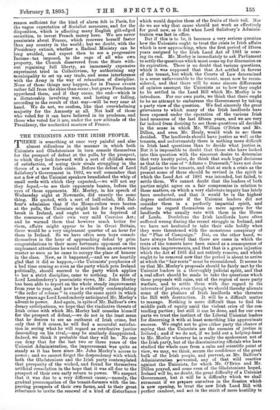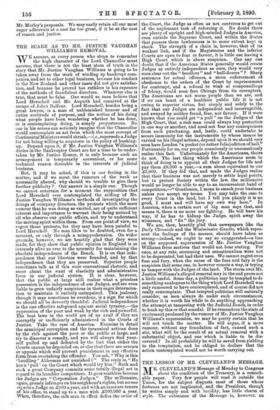THE UNIONISTS AND THE IRISH PEOPLE. T HERE is something at
once very painful and also almost ridiculous in the manner in which both Unionists and Gladstonians in turn console themselves for the prospect of defeat at the polls, by the prospect, to which they look forward with a sort of childish sense of satisfaction, of seeing their rivals struggling in the throes of a new Irish crisis. Before the defeat of Lord. Salisbury's Government in 1892, we well remember that not a few of the Unionist speakers brandished the whip of small cords with which they expected,—we will not say they hoped,—to see their opponents beaten, before the eyes of those opponents. Mr. Morley, in his speech of Wednesday night at Newcastle, did exactly the same thing. He quoted, with a sort of half-relish, Mr. Bal- four's admission that if the Home-rulers were beaten at the polls, the Unionists might look for a fresh out- break in Ireland, and ought not to be deprived of the resources of their own very mild Coercion Act; and he warned them that however much better for them, affairs might appear to be in Great Britain, there would be a very unpleasant quarter of an hour for them in Ireland. So we have often seen boys console themselves in the hour of approaching defeat by grim congratulations to their more fortunate opponent on the unpleasant attentions he would receive from an over-severe master so soon as he came to occupy the place of honour in the class. Now, as it happened,—and we are heartily glad that it did so happen,—the Unionists' prophecies of a bad time coming so soon as the party which pets Ireland politically, should succeed to the party which applies to her a strict discipline, came to nothing. In spite of Lord Londonderry's pessimistic views, Mr. John Morley has been able to report on the whole steady improvement from year to year, and now he is evidently contemplating " the order of release " in exactly the same spirit in which three years ago Lord Londonderry anticipated Mr. Morley's advent to power. And again, in spite of Mr. Balfour's own dreary anticipations, we hope that the vindictive threats of Irish crime with which Mr. Morley half consoles himself for the prospect of defeat,—we do not in the least mean that he desires to see an outburst of Irish crime, but only that if it comes, he will find a mournful satisfac- tion in seeing what he will regard as retributive justice descending on his rival,—may be similarly disappointed. Indeed, we think it probable that they will be. No one can deny that for the last two or three years of the Unionist Administration, the improvement was quite as steady as it has been since Mr. John Morley's access to power ; and we cannot forget the despondency with which both the Gladstonians and the Irish party contemplated that prosperity of the wicked, and found for themselves artificial consolation in the hope that it was all due to the prospect of their own early return to power. We suspect that it was due to a very different cause,—namely, the gradual preoccupation of the tenant-farmers with the im- proving prospects of their own farms, and to their great reluctance to invite the renewal of a kind of disturbance which would deprive them of the fruits of their toil. Nor do we see why that cause should not work as effectively for good now, as it did when Lord Salisbury's Adminis- tration was last in office.
But if this is to be, it becomes a very serious question how the Unionists ought to treat the crisis in Irish affairs which is now approaching, when the first period of fifteen years assigned by the Irish Land Act of 1881 is near- ing its end. Mr. Morley is immediately to ask Parliament to settle the questions which must come up for discussion on its expiration. There is no doubt that various questions, which it was supposed that that Act settled in favour of the tenant, but which the Courts of Law determined in a sense unfavourable to the tenant, must now be recon- sidered, and that there will be some sincere differences of opinion amongst the Unionists as to how they ought to be settled in the Land. Bill which Mr. Morley is to introduce. For our own parts, we think that there ought to be no attempt to embarrass the Government by taking a party view of the question. We feel sincerely the great grievances to which many of the Irish landlords have been exposed under the operation of the various Irish land measures of the last fifteen years, and we are very far indeed from desiring to see these questions all decided in the sense in which Mr. William O'Brien and Mr. Dillon, and even Mr. Healy, would wish to see them decided. The landlords should have justice as well as the tenants, and unfortunately there is nothing more difficult in Irish land questions than to decide what justice is. But it is impossible to doubt that those who have looked into this question with the sincerest desire to determine that very knotty point, do think that such legal decisions as that in the case of " Adams v. Dunseath," have not done full justice to the tenants, and that at such a crisis as the present some of these should be revised in the spirit in which the Land Act of 1881 was intended, but failed, to settle them. We cannot doubt that the leaders of both parties might agree on a fair compromise in relation to these matters, on which a very elaborate inquiry has lately been conducted, and that it would be in the highest degree unfortunate if the Unionist leaders did not consider them in a perfectly impartial spirit, and refuse to regard themselves as mere agents for the landlords who usually vote with them in the House of Lords. Doubtless the Irish landlords have often suffered wrong during the recent struggle in Ireland, and we have not hesitated to take their side boldly when they were threatened with the monstrous conspiracy of the "Plan of Campaign." But, on the other hand, wc have always believed that there are cases in which the rents of the tenants have been raised as a consequence of their own improvements, and that that is a grave injustice which the Act if 1881 did not entirely remove, and which ought to be removed now that the period is about to arrive at which the " fair rents " must be reconsidered. It seems to us that Mr. Morley's proposals should be fairly met by the Unionist leaders in a thoroughly judicial spirit, and that a real effort should be made to take the questions which these proposals will raise, out of the region of mere party warfare, and to settle them with due regard to the interests of justice, even though we should thereby alienate some of the phalanx of Irish landlords who threaten the Bill with destruction. It will be a difficult matter to manage. Nothing is more difficult than to find the middle path of equity amid the violent cries of the con- tending parties ; but still it can be done, and for our own parts we trust the instinct of the Liberal Unionist leaden for discerning it with at least something like approximate success. We ought not to give either party the chance of saying that the Unionists are the enemies of justice in Ireland ; and if we do not, if we hold out a helping-hand to Mr. Morley wherever he is really the spokesman not of the Irish party, but of the discriminating officials who have studied the whole case from a calm and scientific point of view, we may, we think, secure the confidence of the great bulk of the Irish people, and prevent, as Mr. Balfour's Administration prevented, any of that wild reaction against the Unionists, for which Mr. O'Brien and Mr. Dillon prayed, and some even of the Gladstonians hoped. Ireland will be, no doubt, the great difficulty of a Unionist Government, but it will be a difficulty which we shall surmount if we prepare ourselves in the Session which is now opening, to treat the new Irish Land Bill with perfect candour, and not in the spirit of mere hostility to



































 Previous page
Previous page